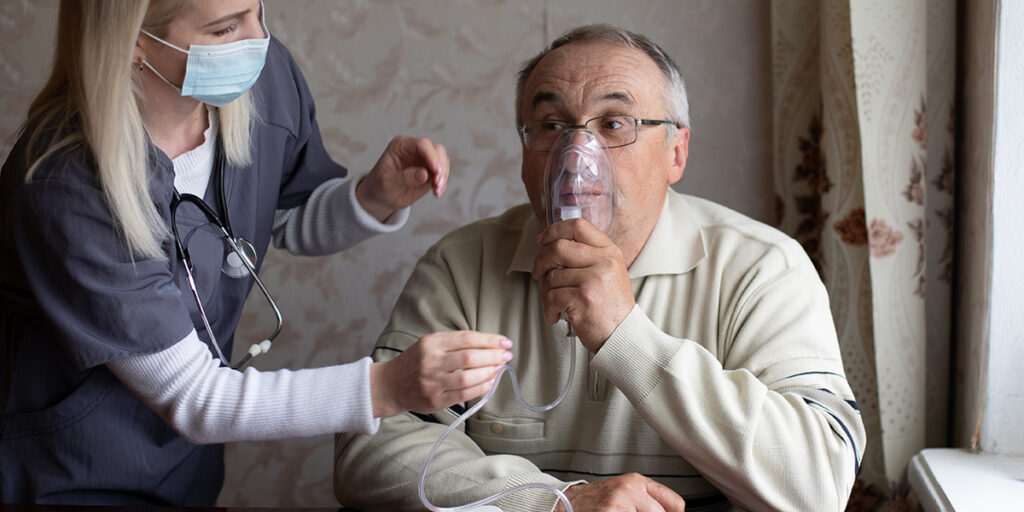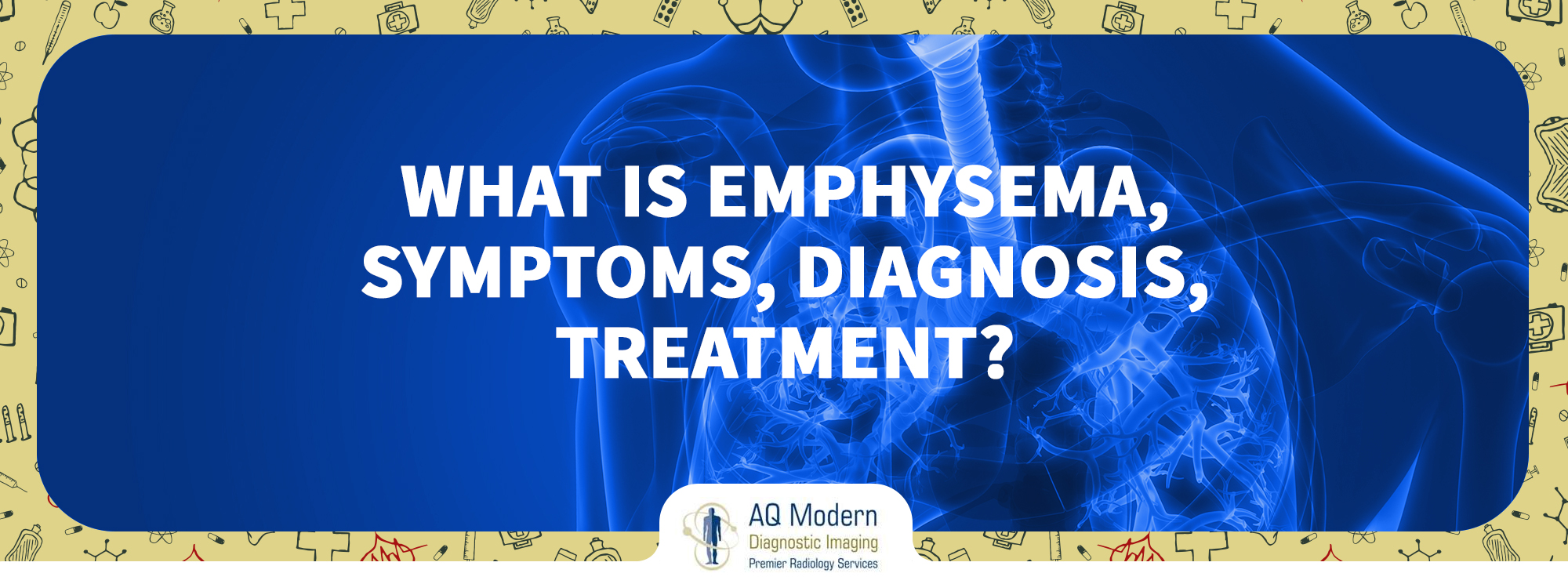Emphysema is a condition that mostly affects men between the ages of 50 and 70. It usually occurs in people who smoke or those who inhale irritants. More than 3 million Americans are estimated to be affected by emphysema. Emphysema affects the air sacs in the lungs, causing them to weaken and break over time.
Emphysema is a type of chronic obstructive pulmonary disease (COPD). People who develop the condition have trouble breathing as less oxygen reaches the lungs. Emphysema leads to enlargening of the air sacs and the lung tissue losing elasticity.
What Causes Emphysema
Many factors can contribute to emphysema, but smoking is the most common. Eliminating smoking can help avoid developing the condition or improve it. A person who regularly breathes intoxicants or irritants damages the air sacs over time.
They can become narrow, destroy, collapse or stretch, leaving a smaller surface area for the lungs to transport oxygen to the blood. This also affects the lungs’ ability to take out carbon dioxide.
Genetic factors such as alpha-1 antitrypsin deficiency can also lead to the development of emphysema. Other causes include workplace or environmental pollutants, secondhand smoking, biomass fuels, and air pollution.
The damage caused to the lungs in emphysema is irreversible and permanent. However, the condition is most likely manageable. According to one 2020 study, people with smaller airways are more likely to develop the condition than those with larger airways.
What are the Symptoms of Emphysema
Emphysema leads to several symptoms that become apparent over time. These include developing a chronic cough producing mucus, experiencing trouble breathing or dyspnea, feeling tightness in the chest, or experiencing a squeaky, whistling, or wheezing sound during breathing.
Symptoms of emphysema usually develop during exertion or exercise. However, as the condition progresses, symptoms can also start affecting routine life during rest periods. The condition progresses over the years.
In the later stage, a person may also develop problems in sleep, depression, anxiety, fatigue, reduced appetite, weight loss, loss of energy, and frequent lung infections.
Types of Emphysema
Emphysema can affect different parts of the lungs leading to the different kinds of emphysema a person may have. It could be paraseptal emphysema, centrilobular emphysema, or pan lobular emphysema.
Centrilobular emphysema is most common in people who smoke and mostly affects the upper lobes. On the other hand, pan lobular emphysema affects both the centrilobular and paraseptal regions of the lungs.
CT Scan services in NJ from a reliable diagnostic center in Edison can help identify the type of emphysema. However, it is important to note that the outlook of the condition and treatment is not affected by the type of emphysema one contracts.
What is the Diagnosis of Emphysema
Someone experiencing emphysema may feel chest tightness and experience shortness of breath and coughing. However, these symptoms alone are enough to diagnose emphysema. If you experience these signs, it is best to visit your doctor.
A diagnosis for emphysema includes taking your medical history as the first step. Your doctor will ask about any recent health changes and lifestyle habits. The doctor may recommend getting diagnostic tests to rule out other conditions.
If someone doesn’t smoke but appears to have the symptoms of the disease. They may be required to test for alpha-1 antitrypsin deficiency. Moreover, lung function tests can help diagnose emphysema. These tests measure the capacity of the lungs to exchange oxygen and carbon dioxide as well as monitor progression and response to treatment.
Other tests that may be recommended include a CT scan of the lungs and chest x-ray to analyze the levels of respiratory gases and their exchange. In the advanced stages of the disease, the lungs appear enlarged. However, a chest X-ray may appear normal in the early stages.
Apart from conducting tests, the doctor may also perform a physical exam to check for unusual signs and symptoms. They will check your blood pressure and weight and listen to your heartbeat. The physical examination will reveal the following signs in case if the condition has advanced:
• Low oxygen levels in the blood
• Having a barrel chest
• Wheezing, which means having difficulty getting the air out of the lungs
• Having rounded fingertips called “clubbing.”
• Pursing your lips while breathing
• Your lips showing a blue tinge, indicating low oxygen levels in the blood
• Being malnutritioned
How to Treat Emphysema
There is no treatment for emphysema, but it can help to slow the condition, manage its symptoms, keep the condition from worsening and boost overall health and well-being. There are several treatment methods that are effective in managing emphysema.
Following are some treatments for Emphysema:
Lifestyle Therapy
 Several steps can allow a person to manage emphysema and slow the progress of the disease. Lifestyle changes are vital in managing symptoms and improving quality of life. Something to try in lifestyle therapy includes:
Several steps can allow a person to manage emphysema and slow the progress of the disease. Lifestyle changes are vital in managing symptoms and improving quality of life. Something to try in lifestyle therapy includes:
• Eating a healthy diet
• Following an exercise regimen
• Avoiding inhaling pollutants and irritants
• Quitting smoking
• Increasing water intake to keep airways open and loosen mucus
• Prevent inhaling cold air during winters by using a face mask
• Practicing pursed-lip breathing, diaphragmatic breathing, and deep breathing
Oxygen Therapy
 Emphysema can lead to difficulty in breathing as the condition progresses. If that happens, oxygen therapy is an effective method for some time to help the patient in breathing. Your healthcare practitioner will discuss if oxygen therapy is the most suitable option for you. Different devices are available which can aid in breathing at home or during traveling.
Emphysema can lead to difficulty in breathing as the condition progresses. If that happens, oxygen therapy is an effective method for some time to help the patient in breathing. Your healthcare practitioner will discuss if oxygen therapy is the most suitable option for you. Different devices are available which can aid in breathing at home or during traveling.
Drug Therapy

Drug therapy is another effective treatment for emphysema to make breathing easier and open the airways. The main medication in this regard is inhaled bronchodilators that facilitate relieving the symptoms.
Different kinds of bronchodilators can be taken through inhalers. These include beta-agonists which help in clearing mucus and relaxing the bronchial muscles. You can also take antimuscarinics or anticholinergics that also help soothe the bronchial muscles. Certain steroids such as fluticasone are also helpful in reducing inflammation.
Regular use of these drugs can enhance lung function and increase exercise capacity. Certain short and long-term drugs can also be combined for treatment. However, drug therapy should be started after consulting your health practitioner.
Surgery

In case of severe emphysema, your healthcare provider may recommend surgery which is conducted to remove the damaged lung tissue and reduce the gaps in the lungs that occur due to the worsened condition.
Transplanting one or both lungs is also an option to improve a person’s life condition. However, it involves the risk of contracting the infection.
Prevention
Since smoking is a major factor of emphysema, leaving it can help prevent the disease. Other prevention strategies to improve the condition and prevent it from worsening include developing healthy eating habits, maintaining a moderate weight, avoiding pollutants and air pollution, and getting routine vaccinations that help prevent infections.
In Conclusion
Emphysema can turn into a life-threatening disease causing irreversible damage to the lungs. Anyone who experiences symptoms should not ignore them and seek timely treatment. If you are an avid smoker, it is vital to stop smoking as it is one of the major reasons for contracting the disease.
People who don’t smoke can also develop the disease. If you experience any symptoms, it’s best to book an appointment with your healthcare practitioner and an appointment with a reliable diagnostic center like AQMDI for CT scan services in NJ as recommended by the doctor. Timely action can help prevent and treat the disease rightly. It will also allow you to better manage the condition and enhance your chances of living a healthy and active life.

